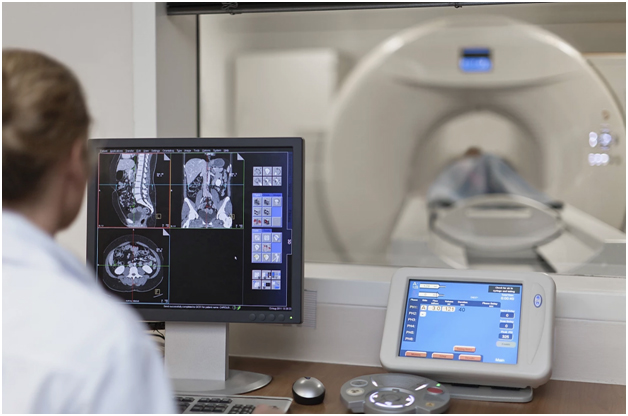G, 43, had a rude shock and felt devastated a year ago when she was diagnosed with ovarian cancer. She was unaware that the bloated feeling in her tummy was associated with the disease.
“I had nausea and a bloated feeling in my tummy for a week. My family doctor diagnosed me as having tummy upset and treated me with gastric medications” G recalled, “but the symptoms persisted and I began to lose my appetite. She then arranged for me to have an ultrasound examination of the pelvis which showed a 5 cm tumour in my left ovary.”
When I examined G, the abdomen was distended with fluid. The left lower abdomen was slightly tender. MRI (Magnetic Resonance Imaging) scan confirmed the left ovarian cyst with solid areas in its wall. There was ascitic fluid in the abdominal cavity with a suggestion of tumour spreading to the peritoneum, the inner lining of the abdominal cavity. The blood level of ovarian tumour marker, CA125, was raised many times above normal.

She had an extensive surgery a week later with removal of the left ovarian tumour together with the uterus, the right ovary and the omentum, the fatty tissue apron covering the intestines. Microscopic examination of the tumour confirmed ovarian cancer with spread to the omentum and peritoneum. The cancer was classified as stage III and chemotherapy was soon administered after she recovered from the surgery.
Ovarian cancer is the second most common gynaecological cancer and the 5th commonest cancer in Singapore. There are 359 cases diagnosed yearly based on the Singapore Cancer Registry 2011-2015.
It is a very silent disease with minimal or no symptoms in early stage. It often goes undetected until it has spread to the abdomen. When this happens, the following symptoms may be present. They include:
- Bloatedness of the tummy
- Indigestion and loss of appetite
- Weight loss
- Abdominal pain
- Change of bowel and urinary habits
Many of these symptoms are non-specific and can also be the symptoms of other less serious conditions such as irritable bowel syndrome. Depending on the extent, the disease is classified into four stages.
- Stage I: cancer is confined to the ovaries.
- Stage II: cancer has spread to the surrounding pelvic organs, such as the fallopian tubes or uterus.
- Stage III: cancer has spread beyond pelvis into other parts of the abdomen.
- Stage IV: cancer has disseminated to distant sites outside the abdomen such as the lungs and brain.
It has been estimated that more than 60% of ovarian cancers are in the advanced stages (stage III and IV) when the patient is first diagnosed. Till now, there is no reliable, effective screening method to detect the disease early.
Because of the late diagnosis, patients with ovarian cancer have a poor outlook despite treatment which usually involves a combination of surgery and chemotherapy. Surgery is usually the initial step. It is done to remove the cancer mass as much as possible and also helps confirm the stage of the disease.
How much surgery to be done would depend on how far the cancer has spread. For very early stage, the surgery may involve removing the affected ovary and its fallopian tube. This procedure is for fertility preservation. In advanced stages, as in G’s case, the ovaries, uterus, cervix, or fallopian tubes have to be removed together with lymph nodes, the omentum and all visible cancer masses.
Chemotherapy may be necessary to kill cancer cells that might remain. These powerful medications are usually given through the vein (intravenous). But sometimes they may work better if they are injected directly into the abdomen.
G had side effects from the chemotherapy. She looked slightly pale and tired on her last review. She had to wear a wig from the hair loss. But she was in good spirits.
“I am a fighter” she said.
Want to find out more about Dr Peter Chew – one of the leading women’s clinic in Singapore? Contact us today! We are based at Gleneagles Hospital.

